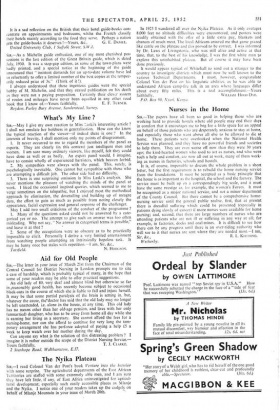Nurses in the Home
SIR,—The papers have all been so good in helping those who are working hard to provide hostels where old people may end their days in comfort that it encourages me to beg for a little space for an appeal on behalf of those patients who are desperately anxious to stay at home, and especially those who want above all else to be allowed to die at home. These patients were overlooked when the National Health Service was planned, and they have no powerful friends and societies to help them. They are even worse off now than they were 30 years ago; the kind-hearted women who used to act as nurses, and who were such a help and comfort, are now all out at work, many of them work- ing as nurses in factories, schools and hostels.
It is, of course, impossible to discuss the whole problem in a short letter, but the first requirement is to rebuild the home nursing service from the foundations. It must be accepted as a basic principle that the home is as important as the hospital, the school and the factory. The service must be built up on a correspondingly big scale, and it must have the same prestige as. for example, the women's Forces. It must be recognised as a major national service, and not a minor department of the County Council. But there cannot be a comprehensive home- nursing service until the general public realise, first, that at present there is dreadful suffering which could be prevented (especially in patients dying slowly of cancer) if more nurses were available for home nursing; and, second, that there are large numbers of nurses who are attending patients who are not ill or suffering in any way at all; for example, in factories, docks and coal-mines. It is difficult to see how there can be any progress until there is an over-riding authority who will see to it that nurses are sent where they are needed most.—I am,


































 Previous page
Previous page